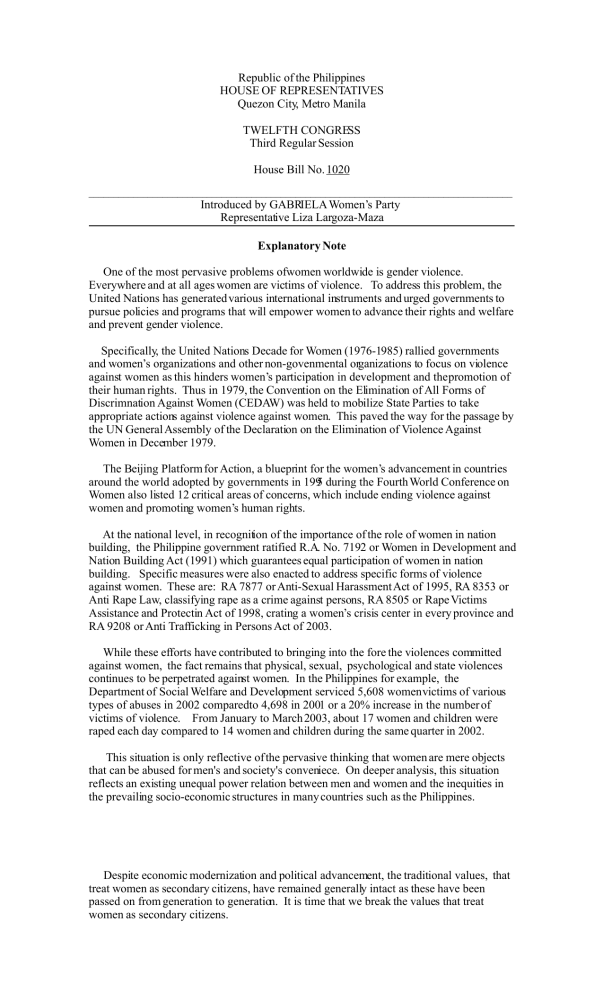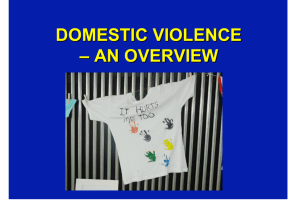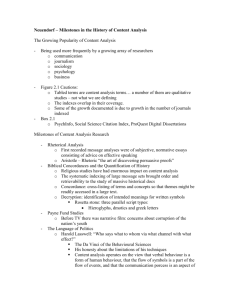Republic of the Philippines

Republic of the Philippines
HOUSE OF REPRESENTATIVES
Quezon City, Metro Manila
TWELFTH CONGRESS
Third Regular Session
House Bill No. 1020
______________________________________________________________________________________
Introduced by GABRIELA Women’s Party
Representative Liza Largoza-Maza
Explanatory Note
One of the most pervasive problems of women worldwide is gender violence.
Everywhere and at all ages women are victims of violence. To address this problem, the
United Nations has generated various international instruments and urged governments to pursue policies and programs that will empower women to advance their rights and welfare and prevent gender violence.
Specifically, the United Nations Decade for Women (1976-1985) rallied governments and women’s organizations and other non-govenmental organizations to focus on violence against women as this hinders women’s participation in development and the promotion of their human rights. Thus in 1979, the Convention on the Elimination of All Forms of
Discrimnation Against Women (CEDAW) was held to mobilize State Parties to take appropriate actions against violence against women. This paved the way for the passage by the UN General Assembly of the Declaration on the Elimination of Violence Against
Women in December 1979.
The Beijing Platform for Action, a blueprint for the women’s advancement in countries around the world adopted by governments in 1995 during the Fourth World Conference on
Women also listed 12 critical areas of concerns, which include ending violence against women and promoting women’s human rights.
At the national level, in recognition of the importance of the role of women in nation building, the Philippine government ratified R.A. No. 7192 or Women in Development and
Nation Building Act (1991) which guarantees equal participation of women in nation building. Specific measures were also enacted to address specific forms of violence against women. These are: RA 7877 or Anti-Sexual Harassment Act of 1995, RA 8353 or
Anti Rape Law, classifying rape as a crime against persons, RA 8505 or Rape Victims
Assistance and Protectin Act of 1998, crating a women’s crisis center in every province and
RA 9208 or Anti Trafficking in Persons Act of 2003.
While these efforts have contributed to bringing into the fore the violences committed against women, the fact remains that physical, sexual, psychological and state violences continues to be perpetrated against women. In the Philippines for example, the
Department of Social Welfare and Development serviced 5,608 women victims of various types of abuses in 2002 compared to 4,698 in 2001 or a 20% increase in the number of victims of violence. From January to March 2003, about 17 women and children were raped each day compared to 14 women and children during the same quarter in 2002.
This situation is only reflective of the pervasive thinking that women are mere objects that can be abused for men's and society's conveniece. On deeper analysis, this situation reflects an existing unequal power relation between men and women and the inequities in the prevailing socio-economic structures in many countries such as the Philippines.
Despite economic modernization and political advancement, the traditional values, that treat women as secondary citizens, have remained generally intact as these have been passed on from generation to generation. It is time that we break the values that treat women as secondary citizens.
The pervasive patriarchal culture that views and treats women as objects and properties of men must be transformed into one that looks and treats women as equal partners in development and nation building. Towards this, a massive education and reorientation on gender roles in society and the important contributions specifically of women in society must be incessantly and systematically carried out. Legislative measure is one of the instruments that can promote positive values towards women, uphold the dignity and human rights of every person in society, and appreciate the vital contributions of women and men in national development.
At the international level, the United Nations General Assembly at its 83rd plenary meeting of the 54th session on December 17, 1999 adopted Resolution 54/134 on the
International Day for the Elimination of Violence Against Women. The UN General
Assembly in this resolution decided to designate November 25 as the International Day for the Elimination of Violence Against Women.
In the said resolution, the UN General Assembly invites, as appropriate, Governments, the relevant agencies, bodies, funds and programmes of the United Nations system, and other international organizations and non-governmental organizations to organize on that day activities designed to raise public awareness of the problem of violence against women.
Also in the same resolution, the UN General Assembly expresses concern that some groups of women, such as women belonging to minority groups, indigenous women, refugee women, migrant women, women living in rural or remote communities, destitute women, women in institutions or in detention, the girl child, women with disabilities, elderly women and women in situations of armed conflict, are especially vulnerable to violence. It also exhibits alarm that women do not fully enjoy their human rights and fundamental freedoms, and concern about the long-standing failure to protect and promote those rights and freedoms in relatin to violence against women.
In the resolution, member states also recognize that violence against women is a manifestation of historically unequal power relations between men and women, which have led to domination over and discrimination against women by men, the prevention of their full advancement. They also affirmed that violence against women is one of the crucial social mechanisms by which women are forced into subordinate positions, compared with men.
November 25 is significant to many women's organizations and movements worldwide. This was the day when three sisters (Patria, Maria Teresa and Minerva
Mirabal) from the Dominican Republic, who were involved in activities against the Trujillo dictatorship, were persecuted and later on assasinated in an accident on November 25,
1960. The sisters referred to as the "Inolvidables Mariposas", the "Unforgettable
Butterflies" have become a symbol of victimization of women. They have become symbols against prejudice and stereotypes.
The death of the three sisters caused public uproar not only in the Dominican Republic but in the whole Latin American region. The protests also spread in other countries that a
16 Days of Activism Against Gender Violence which starts on November 25 and ends on
December 10 every year was launched by 23 women organizations from 20 countries led by the Center for Women's Global Leadership in 1991.
In the Philippines, as early as 1999 women organizations have been commemorating
November 25 as the International Day Against Violence Against Women. Consciousness raising activities, protest actions, seminars and theater presentations have been mounted to highlight the issue of violence against women during this day. However, these efforts are very limited and center mainly in the key cities of the country.
To have an enabling mechanism for this UN General Assembly resolution at the national level, this bill proposes that November 25 of every year be observed in the
Philippines as a National Consciousness Day For the Elimination of Violence Against
Women and that appropriate mechanisms be made available to realize this effort.
Toward this end, the support of this bill is earnestly sought.
LIZA LARGOZA-MAZA
Republic of the Philippines
HOUSE OF REPRESENTATIVES
Quezon City, Metro Manila
TWELFTH CONGRESS
Third Regular Session
HOUSE BILL No.____________
Introduced by GABRIELA Women’s Party List
Representative Liza Largoza-Maza
________________________________________________________________________
AN ACT
DECLARING NOVEMBER TWENTY –FIVE OF EVERY YEAR
AS NATIONAL CONSCIOUSNESS DAY FOR THE ELIMINATION OF
VIOLENCE AGAINST WOMEN
Be it enacted by the House of Representatives and the Senate of the Philippines inCongress
Assembled:
SECTION 1. November 25 or every year is hereby declared as a "National
Consciousness Day for the Elimination of Violence Against Women".
SECTION 2. The following activities shall be done in observance of this day:
a. Heads of government agencies and instrumentalities, governmentowned and controlled corporations, local government units, employers in the private sector should allow sufficient time and opportunities for them and their employees to organize, engage or participate in activities designed to raise public awareness on the problem of violence and the elimination of violence against women on that day.
b. The Kapisanan ng mga Broadkaster sa Pilipinas, television and radio stations nationwide shall allocate a minimum of one (1) hour airtime for programs exclusively raising public awareness on the problem of violence and the elimination of all forms of violence against women on that day.
c. The newpapers and magazines public articles higlighting the problem of violence and the elimination of all forms of violence against women on that day.
d. The Department of Education and Commission on Higher Education, in coordination with the National Commission on the Role of Filipino Women and women non-governmental organizations shall lead public and private school communities at all levels in organizing consciousness raising activities on the elimination of violence against women on that day.
e. The National Statistics Office, Philippine National Police, and the
Department of Social Welfare and Development in coordination with the National
Commission on the Role of Filipino Women shall undertake data gathering and systematize data banking system on all forms of violence against women.
SECTION 3. A compliance and monitoring team composed of one (1) duly designated representative from each of the following agencies - The National Commission on the Role of Filipino Women, the Department of Social Welfare and Development, the
Department of Education, Commission on Higher Education, the Department of Interior and Local Governments and three NGO representatives coming from the sectors of women, children, and overseas Filipino workers- shall be created to coordinate and monitor the implementation of this measure.
The team shall be headed by the duly designated representative of the National
Commission on the Role of the Filipino Women. Members of the team shall receive emoluments as may be determined by the team in accordance with existing budget and accounting rules and regulations.
SECTION 4. Funds be allocated from the 5% GAD budget alloted to all government agencies and local government units for the implementationof the above activities, programs and projects.
SECTION 5. If, for any reason, any section or provision of this ACT is held to be unconstitutional or invalid, the validity of other sections herein shall not be affected thereby.
SECTION 6. This Act shall take effect fifteen (15) days from the date of its approval.
Approved,









